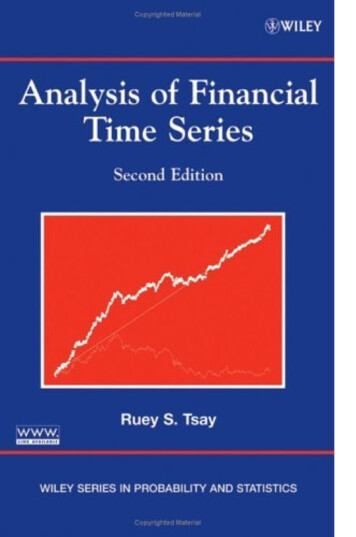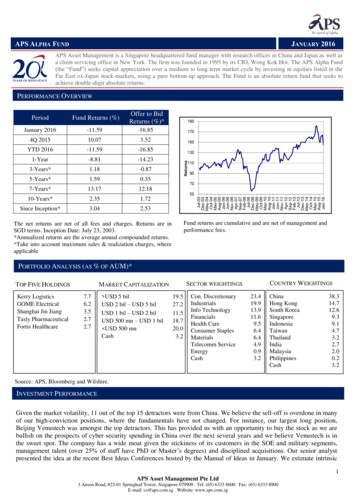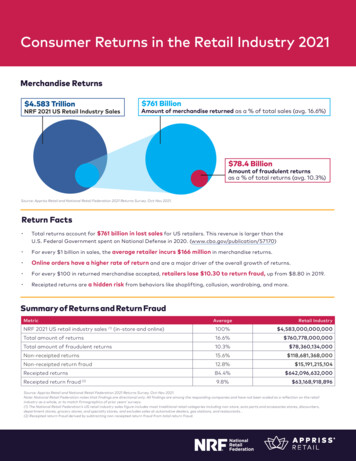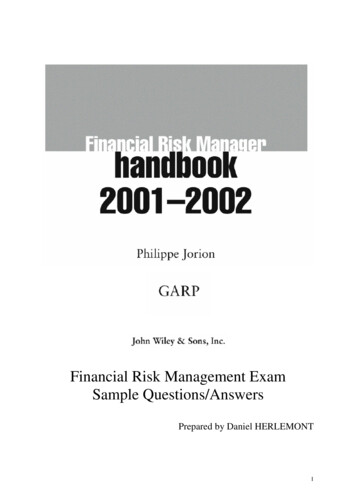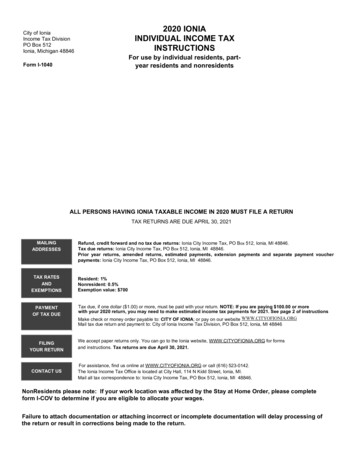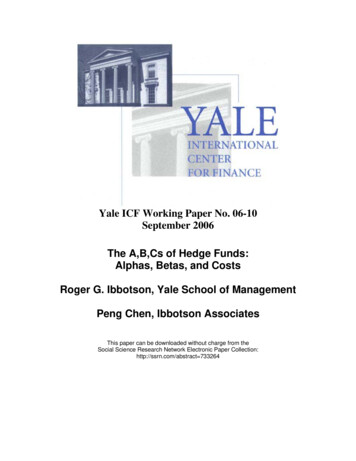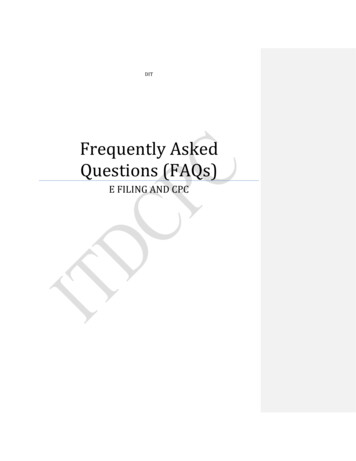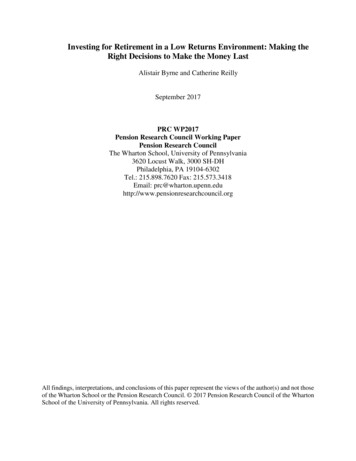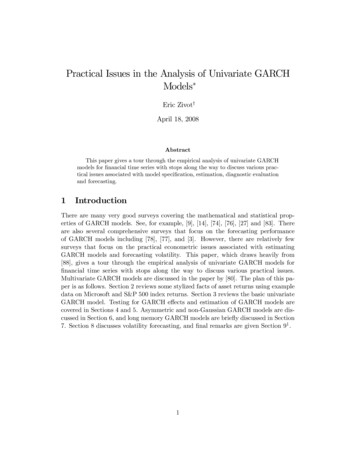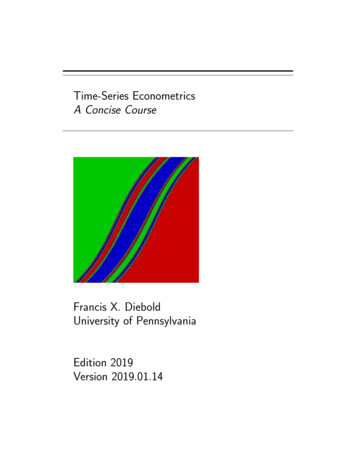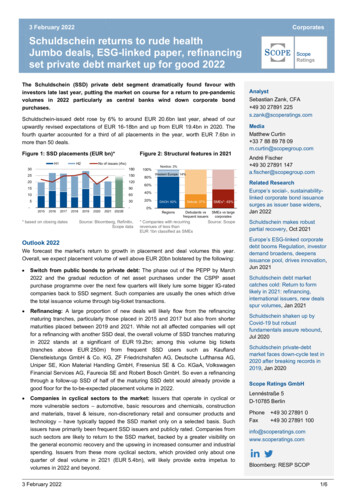
Transcription
3 February 2022Schuldscheinreturns to rude healthCorporatesJumbo deals,ESG-linkedpaper,healthrefinancing set private debt market up forSchuldscheinreturnsto rudegood 2022Jumbo deals, ESG-linked paper, refinancingset private debt market up for good 2022The Schuldschein (SSD) private debt segment dramatically found favour withinvestors late last year, putting the market on course for a return to pre-pandemicvolumes in 2022 particularly as central banks wind down corporate bondpurchases.Schuldschein-issued debt rose by 6% to around EUR 20.6bn last year, ahead of ourupwardly revised expectations of EUR 16-18bn and up from EUR 19.4bn in 2020. Thefourth quarter accounted for a third of all placements in the year, worth EUR 7.6bn inmore than 50 deals.Figure 1: SSD placements (EUR bn)*H1H2Figure 2: Structural features in 2021No of issues (rhs)30180251502012015901060530-201520162017* based on closing dates2018201920202021 2022E-Source: Bloomberg, Refinitiv,Scope data100%80%Nordics: 3%Western Europe: 14%60%40%20%0%DACH: 82%RegionsDebuts: 37%SMEs*: 49%Debutants vsSMEs vs largecorporatesfrequent issuers* Companies with recurringrevenues of less thanEUR 1bn classified as SMEsSource: ScopeOutlook 2022We forecast the market’s return to growth in placement and deal volumes this year.Overall, we expect placement volume of well above EUR 20bn bolstered by the following: Switch from public bonds to private debt: The phase out of the PEPP by March2022 and the gradual reduction of net asset purchases under the CSPP assetpurchase programme over the next few quarters will likely lure some bigger IG-ratedcompanies back to SSD segment. Such companies are usually the ones which drivethe total issuance volume through big-ticket transactions.Refinancing: A large proportion of new deals will likely flow from the refinancingmaturing tranches, particularly those placed in 2015 and 2017 but also from shortermaturities placed between 2019 and 2021. While not all affected companies will optfor a refinancing with another SSD deal, the overall volume of SSD tranches maturingin 2022 stands at a significant of EUR 19.2bn; among this volume big tickets(tranches above EUR 250m) from frequent SSD users such as KauflandDienstleistungs GmbH & Co. KG, ZF Friedrichshafen AG, Deutsche Lufthansa AG,Uniper SE, Kion Material Handling GmbH, Fresenius SE & Co. KGaA, VolkswagenFinancial Services AG, Faurecia SE and Robert Bosch GmbH. So even a refinancingthrough a follow-up SSD of half of the maturing SSD debt would already provide agood floor for the to-be-expected placement volume in 2022.Companies in cyclical sectors to the market: Issuers that operate in cyclical ormore vulnerable sectors – automotive, basic resources and chemicals, constructionand materials, travel & leisure, non-discretionary retail and consumer products andtechnology – have typically tapped the SSD market only on a selected basis. Suchissuers have primarily been frequent SSD issuers and publicly rated. Companies fromsuch sectors are likely to return to the SSD market, backed by a greater visibility onthe general economic recovery and the upswing in increased consumer and industrialspending. Issuers from these more cyclical sectors, which provided only about onequarter of deal volume in 2021 (EUR 5.4bn), will likely provide extra impetus tovolumes in 2022 and beyond.3 February 2022AnalystSebastian Zank, CFA 49 30 27891 225s.zank@scoperatings.comMediaMatthew Curtin 33 7 88 89 78 09m.curtin@scopegroup.comAndré Fischer 49 30 27891 147a.fischer@scopegroup.comRelated ResearchEurope’s social-, sustainabilitylinked corporate bond issuancesurges as issuer base widens,Jan 2022Schuldschein makes robustpartial recovery, Oct 2021Europe’s ESG-linked corporatedebt booms Regulation, investordemand broadens, deepensissuance pool, drives innovation,Jun 2021Schuldschein debt marketcatches cold: Return to formlikely in 2021: refinancing,international issuers, new dealsspur volumes, Jan 2021Schuldschein shaken up byCovid-19 but robustfundamentals assure rebound,Jul 2020Schuldschein private-debtmarket faces down-cycle test in2020 after breaking records in2019, Jan 2020Scope Ratings GmbHLennéstraße 5D-10785 BerlinPhoneFax 49 30 27891 0 49 30 27891 erg: RESP SCOP1/6
Schuldschein returns to rude healthJumbo deals, ESG-linked paper, refinancing set private debt market up forgood 2022Schuldschein segment always good for a surpriseDeal makers back in force in Q4Deal volume standing at about EUR 20.6bn from 144 deals that for which we’ve seenorder books closed, exceeding our revised forecasts of a range between EUR 16-18bn.Transaction volumes accelerated in the fourth quarter which accounted for more than athird of overall placements in 2021, raising about EUR 7.7bn in more than 50 deals.Multiple jumbo deals at year-endJumbo deals, all above EUR 250m, were responsible for the end-of-year surge in SSDissuance. Issuers included Asklepios Kliniken, Baywa, Domicil Real Estate Group,Faurecia, Fraport, Groupe SEB, Intersnack and Medicover. Strong 4Q activity pushed upthe median deal size to EUR 94m for the full year (Figure 4) from EUR 75m during thefirst 9M.Figure 3: The year of SMEs with a record share coming fromSMEsFigure 4: Median deal size well below historicalaverage despite surge in jumbo deals at YE 2021SMEs vs large caps (measured in number of transactions)Range of ticket sizes in EUR m (box plots) –logarithmic axisMid and small capsLarge %28%20%25%40%2011 2012 2013 2014 2015 2016 2017 2018 2019 2020 2021Source: ScopeThe year of the SMEs – SSDattracts smaller companies1012011 2012 2013 2014 2015 2016 2017 2018 2019 2020 2021Source: ScopeThe return of large-cap companies with bigger deal tickets during Q4 2021 contrastedwith the active use of the SSD segment by SMEs (in this context, companies recurringrevenue below EUR 1bn) which accounted for roughly 50% of all placements (based onthe number of transactions – Figure 3). One feature was the high proportion of SMEsamong first-time SSD users which stood at slightly more than 60% last year (Figure 5).The heavy presence of unrated smaller SSD debutants is a throwback to the segment’sboom years which subsequently turned out to involve a number of “black sheep” –financially troubled companies whose performance risked tarnishing the reputation of thebuy-to-hold SSD market. This time around, we are less concerned partly because manyof today’s SME issuers are operating in less risky sectors (Figure 6) as outlined in ourOct 2021 SSD update. Investors and arrangers are more wary of backing SSD deals fromdebutants in disrupted or vulnerable sectors to avoid defaults or debt restructurings suchas the ones from ETERNA Mode Holding GmbH, EMAG Group or NAC 29 DAC in 2021.3 February 20222/6
Schuldschein returns to rude healthJumbo deals, ESG-linked paper, refinancing set private debt market up forgood 2022Figure 5: High share of SMEs among SSD debutantsFigure 6: Sector attribution among SMEs70%Others21%60%Automobiles &Components1%50%40%30%Healtcare andequipment4%20%Materials7%10%0%Real Estate36%TechnologyHardware &Equipment3%Capital Goods13%2011 2012 2013 2014 2015 2016 2017 2018 2019 2020 2021Utilities15%Source: ScopePause in market’sinternationalisation set to endSource: ScopeInternationalisation resumedThe return of issuers outside of the SSD’s core market of Germany is progressing moreslowly than expected. Overall deal volume from non-German companies stood at morethan a third of the total in 2021, corresponding to 38% of placed debt volume from 47transactions, but that was down from 40-47% during 2016-2019.Among the big issuers last year were Austria’s Constantia Flexibles International GmbH,Mayr Melnhof Karton AG, Plansee Holding AG, RHI Magnesita GmbH and SwarcoHolding AG; French companies Fareva SA, Faurecia SE, Groupe SEB, Iliad SA, OrpeaSA and Quadient SA, Luxemburg’s Encevo SA, and Sweden’s Medicover. Moreencouraging for the future, non-German companies were responsible for more than 40%of debutant deals in 2021, a good signal that the internationalisation of the debt segmentwas just on hold in 2020 when less than 20% of deals were from internationalnewcomers. Hence, we are confident that the rollout of the German debt instrument toacross Europe will continue in 2022Figure 7: Return of non-German issuersFigure 8: 2021 split of SSD transactions(measured in number of transactions)German versus non-German SSD issuers(measured in number of 6%55%61%58%53%75%72%70%68%81%40%0%Nordics Others3%2%CH3%60%20%FR6%DE67%2011 2012 2013 2014 2015 2016 2017 2018 2019 2020 2021Source: Scope3 February 2022Source: Scope3/6
Schuldschein returns to rude healthJumbo deals, ESG-linked paper, refinancing set private debt market up forgood 2022ESG-linked deals: From record to record28% share of placed SSD debtattached to ESG topicsEnthusiasm for the placement in ESG-linked Schuldschein deals, either project- or targetbased, has grown, with a marked acceleration in Q4 2021. We counted 22 ESG-linkedSSD deals in 2021 equivalent to fund raising worth EUR 5.7bn. This corresponds toalmost 30% of total placed SSD debt from just 15% of the issuers active in 2021. Againthe SSD market appears to be running a little ahead of the market for publicly tradedEuropean non-financial corporate bonds of which slightly less than a quarter was linkedto ESG targets or earmarked for ESG-related projects last year. (see Europe’s social-,sustainability-linked corporate bond issuance surges as issuer base widens).Figure 9: ESG-linked SSDs with similar trends as in publicbond market (project-based and target-based SSDs linkedto ESG-topics)Placed volume (EURbn)Number of placements igure 10: ESG-linked SSDs with significant share amongtotal placements2018201920202021Source: Scope28%15%Inner circle: based on number of transactionsOuter circle: based on placed debt volumeSource: ScopeSource: ScopeESG-linked SSD suitable for allsizes and company typesESG-linked SSD placements of such a scale might suggest that issuers were largelylarge-cap companies but in fact issuance was almost evenly split between SMEs andlarger corporates, involving a wide range of deal sizes, from EUR 30m placed by MPHolding to EUR 700m placed by Traton AG and Faurecia SE.But interest step-up/down justwindow dressing?Almost all target-linked ESG deals (ESG score/rating or fulfilment of KPIs) werestructured with incentives (reduction of interest rate if target/KPIs are fulfilled) andpenalties (rate increase if KPIs/targets are not fulfilled). This is structurally different fromESG-linked bonds which are mostly just linked to a penalty but not an incentive.However, the penalties/rate increases and incentives/rate reductions, ranging from -5bpsto 10bps (with majority being /- 2.5-5bps) are so slim that they amount to no more thanwindow dressing.ESG-linked SSD volume higherthan 33% in 2022We assume that the issuance of ESG-linked debt on the SSD segment will continue to doslightly better than the wider public bond market this year where we expect volumes toplateau at around a third of overall issuance this year. The year has already been kickedoff with the announcement of two new ESG-linked SSD transactions from German SMEinvestment company Indus Holding and real estate company Degewo AG.3 February 20224/6
Schuldschein returns to rude healthJumbo deals, ESG-linked paper, refinancing set private debt market up forgood 2022Reduced average spreads reflect Covid-19 aftermath and sector splitRisk premium falls in line withbond marketComparing risk spreads for transactions in 2020 and 2021 with the boom years of theSchuldschein in 2016-2019 is difficult given the lower number of data points in the pasttwo years. In general, average risk spreads have followed the trend in the public bondmarket. The perceived average risk premium has certainly benefited from the lowermacroeconomic risk premium after the initial Covid-19 shock in 2020 judging by themedian spread above mid-swaps for five-year euro SSD-tranches (based on 53 datapoints). The dominance of SSD issuance from companies in less cyclical, more defensivesectors has helped lower the average risk premium.Such return to ‘normality’ in the aftermath of the Covid crisis of 2020 seems clear fromthe pricing achieved by companies which consistently placed debt both in 2020 and 2021when they secured more favourable rates, e.g. Asklepios Kliniken GmbH & Co. KGaA,Globus Holding GmbH & Co KG, Gerresheimer AG or Orpea SE.Figure 11: Median annual spreads on SSD placements 2016-21 (in bps) compared with average corporate bond spreadmeasured by Bloomberg Pan European Aggregate Corporate Average OAS (orange line, rhs)Source: Bloomberg, Scope3 February 20225/6
Schuldschein returns to rude healthJumbo deals, ESG-linked paper, refinancing set private debt market up forgood 2022Scope Ratings GmbHHeadquarters BerlinLennéstraße 5D-10785 BerlinFrankfurt am MainNeue Mainzer Straße 66-68D-60311 Frankfurt am MainParis23 Boulevard des CapucinesF-75002 ParisPhone 49 30 27891 0Phone 49 69 66 77 389 0Phone 33 1 8288 5557OsloKarenslyst allé 53N-0279 OsloMadridPaseo de la Castellana 141E-28046 MadridMilanVia Nino Bixio, 3120129 Milano MIPhone 47 21 62 31 42Phone 34 91 572 67 11Phone 39 02 30315 814Scope Ratings UK LimitedLondon52 Grosvenor GardensLondon SW1W 0AUPhone 44 20 7824 aimer 2022 Scope SE & Co. KGaA and all its subsidiaries including Scope Ratings GmbH, Scope Ratings UK Limited, ScopeAnalysis GmbH, Scope Investor Services GmbH, and Scope ESG Analysis GmbH (collectively, Scope). All rights reserved. Theinformation and data supporting Scope’s ratings, rating reports, rating opinions and related research and credit opinions originatefrom sources Scope considers to be reliable and accurate. Scope does not, however, independently verify the reliability andaccuracy of the information and data. Scope’s ratings, rating reports, rating opinions, or related research and credit opinions areprovided ‘as is’ without any representation or warranty of any kind. In no circumstance shall Scope or its directors, officers,employees and other representatives be liable to any party for any direct, indirect, incidental or other damages, expenses of anykind, or losses arising from any use of Scope’s ratings, rating reports, rating opinions, related research or credit opinions. Ratingsand other related credit opinions issued by Scope are, and have to be viewed by any party as, opinions on relative credit risk andnot a statement of fact or recommendation to purchase, hold or sell securities. Past performance does not necessarily predictfuture results. Any report issued by Scope is not a prospectus or similar document related to a debt security or issuing entity.Scope issues credit ratings and related research and opinions with the understanding and expectation that parties using them willassess independently the suitability of each security for investment or transaction purposes. Scope’s credit ratings addressrelative credit risk, they do not address other risks such as market, liquidity, legal, or volatility. The information and data includedherein is protected by copyright and other laws. To reproduce, transmit, transfer, disseminate, translate, resell, or store forsubsequent use for any such purpose the information and data contained herein, contact Scope Ratings GmbH at Lennéstraße 5D-10785 Berlin.3 February 20226/6
Uniper SE, Kion Material Handling GmbH, Fresenius SE & Co. KGaA, Volkswagen Financial Services AG, Faurecia SE and Robert Bosch GmbH. Soeven a refinancing through a follow-up SSD of half of the maturing SSD debt would already provide a good floor for the to-be-expected placement volume in 2022. Companies in cyclical sectors to the market:
